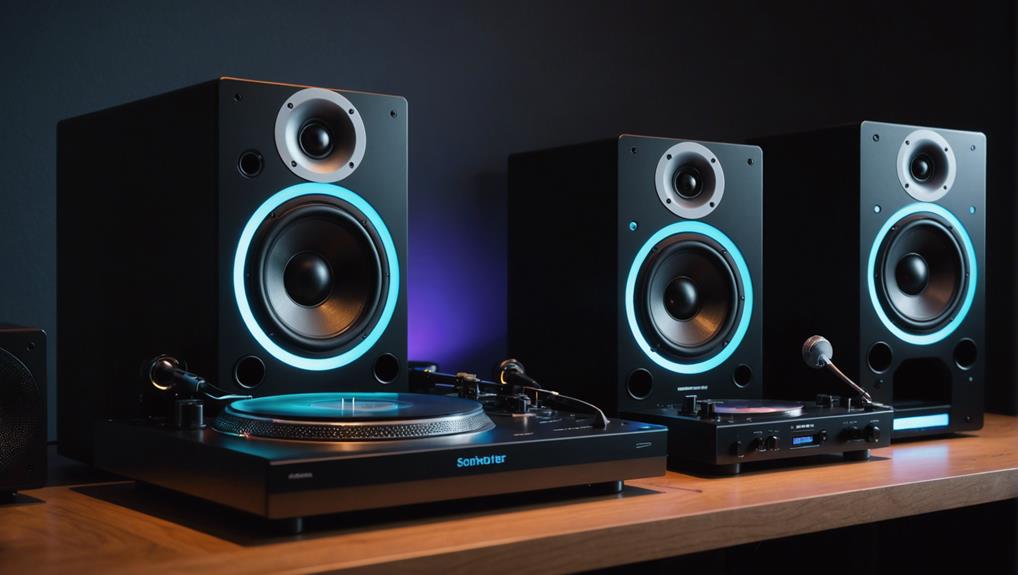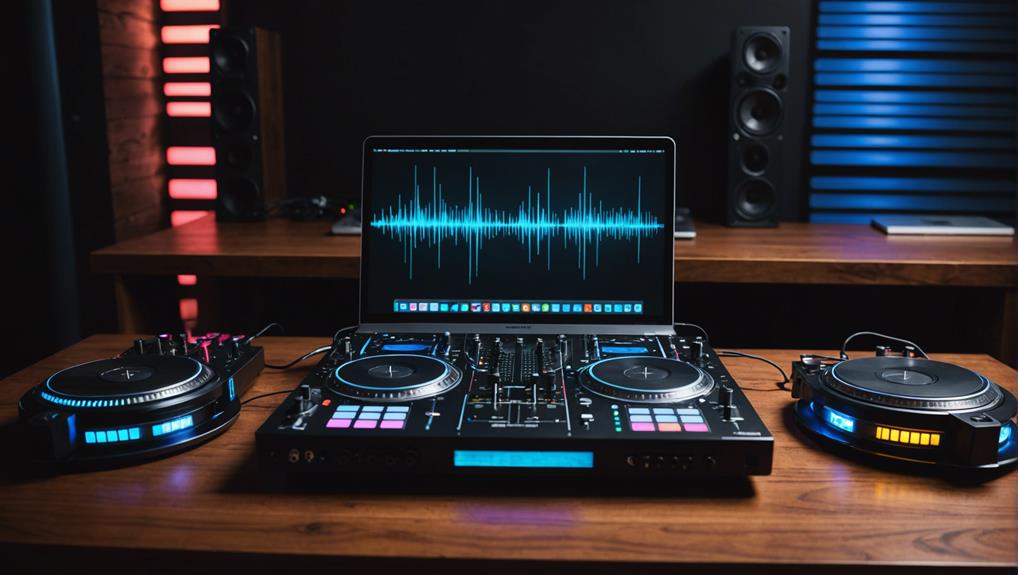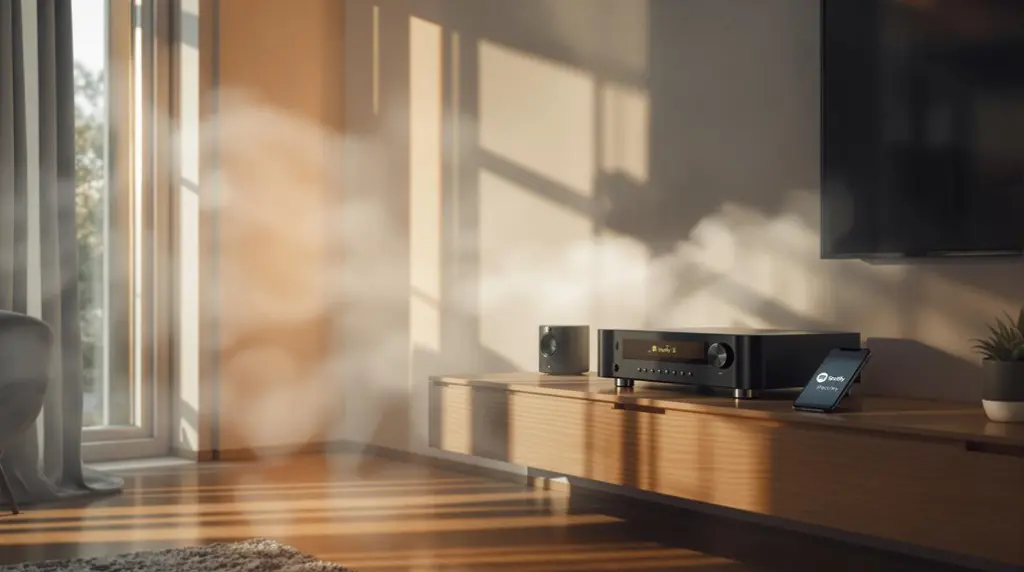Establishing an effective home DJ setup necessitates thoughtful consideration of seven key components to guarantee peak performance and sound quality. The cornerstone of this setup is a versatile DJ controller that integrates the functionalities of decks and a mixer, enhanced with performance pads for samples and effects. Complementing this is a powerful laptop, equipped with robust processing power and ample storage to facilitate seamless integration with DJ software. High-quality headphones and speakers are imperative for accurate sound monitoring and clear audio output. However, these elements merely scratch the surface of what is essential—intrigued to explore the full spectrum of indispensable DJ gear?
Key Takeaways
- Invest in a versatile DJ controller with integrated decks and a mixer for seamless mixing and performance.
- Use a high-performance laptop with robust processing power, at least 8GB of RAM, and solid-state drives.
- Choose advanced DJ software with features like waveform displays, hot cues, and extensive controller integration.
- Opt for closed-back headphones for accurate sound monitoring and noise isolation during performances.
- Select high-quality speakers with clear, balanced sound and sufficient power for an enhanced listening experience.
DJ Controller
A DJ controller, frequently regarded as the cornerstone of a home DJ setup, is a sophisticated device that amalgamates two decks and a mixer into a single, compact unit, facilitating seamless digital DJing through a computer interface. These devices typically connect to a laptop via USB, offering a plethora of features including performance pads for triggering samples and effects, and extensive DJ software integration. This integration allows for intuitive control and manipulation of music tracks, essential for creating seamless mixes.
Controller customization is a significant aspect that professionals and enthusiasts alike should consider. Customizable controls, such as assignable pads, knobs, and faders, enable DJs to tailor their equipment to their unique style and workflow. This personalization can enhance performance efficiency and creativity, making it indispensable for serious practitioners.
The advent of wireless connectivity has further revolutionized DJing, granting users the freedom to connect their controllers to other devices without the constraints of cables. This enhancement not only simplifies setup but also facilitates more dynamic and mobile performances.
Investing in a quality DJ controller, with advanced features and customization options, is pivotal for those aiming to refine their skills and enhance their home DJ setups to professional standards.
Laptop
When selecting a laptop for your home DJ setup, prioritize ensuring that it meets the stringent system requirements of your preferred DJ software to guarantee seamless operation.
Opt for models featuring robust processing power and substantial RAM to effectively manage extensive music libraries and complex production tasks.
Additionally, consider devices with ample storage capacity and superior graphics capabilities to enhance overall performance and reliability in a professional DJ environment.
Software Compatibility and Requirements
Selecting a laptop with a robust processor, such as an Intel i5 or i7, and at least 8GB of RAM is essential for ensuring excellent performance of DJ software applications. These system specifications are important to meet the minimum requirements of popular DJ software such as Serato DJ Pro, Rekordbox, and Traktor. Ensuring your laptop aligns with these prerequisites will facilitate smooth operation and prevent lag during live performances.
Additionally, consider the following aspects to enhance software compatibility and overall functionality:
- Storage Capacity: Opt for a Solid State Drive (SSD) to reduce loading times significantly and provide ample space for your music library and software installations.
- Controller Compatibility: Verify that your laptop is compatible with your DJ controller or interface. This ensures efficient communication between your hardware and software, minimizing potential latency issues.
- Operating System Updates: Regularly updating your operating system and DJ software is important. This practice prevents glitches and ensures compatibility with the latest features and security patches.
- USB Ports and Connectivity: Ensure your laptop has sufficient USB ports and connectivity options. This is important for connecting multiple peripherals such as controllers, interfaces, and external storage devices.
Processing Power and Storage
To guarantee smooth DJ software performance, it is essential to equip your laptop with a high-performance processor and sufficient RAM, typically an Intel i5 or i7 and at least 8GB of RAM. This guarantees the system can handle the demands of DJ applications like Serato DJ Pro, Traktor Pro, or Rekordbox without latency issues.
Additionally, solid-state drives (SSD) are recommended for storage, as they offer faster read/write speeds, enhancing the overall responsiveness of your setup.
Ample storage is vital for housing extensive music libraries and software. While internal SSDs provide quick access, external hard drives are invaluable for expanded storage and music organization. Utilizing high-capacity external hard drives, you can categorize and manage your tracks efficiently, ensuring smooth set shifts.
Equally important is implementing a robust file backup strategy. Cloud storage solutions like Google Drive, Dropbox, or iCloud ensure your music files and software settings are secure and easily retrievable in case of hardware failure. Regularly backing up your files to the cloud mitigates risks associated with data loss, maintaining the integrity of your DJ setup.
Lastly, ensure your laptop is consistently updated and optimized. Regular software updates, system maintenance, and battery management are essential practices to sustain peak performance during DJ sessions.
DJ Software
Leveraging advanced features such as waveform displays, hot cues, and loop functions, DJ software like Serato DJ Pro and Rekordbox revolutionizes how DJs manage music and craft seamless, engaging sets. These applications offer deep levels of software customization, allowing DJs to tailor their interfaces and functionalities to align perfectly with their unique styles and preferences. Additionally, an abundance of online resources, including tutorials and forums, empower users to maximize their proficiency and explore innovative techniques.
Workflow optimization is a critical aspect of modern DJing, and these software platforms excel in this area. By integrating with a wide range of DJ controllers, they ensure smooth control over track selection, mixing, and effects management. This integration enhances the overall performance, making sets more dynamic and engaging.
Here are some essential features of leading DJ software:
- Waveform Displays: Visual representations of tracks that assist in precise beat matching and mixing.
- Hot Cues: Mark and jump to specific points in a track instantly, facilitating creative mixing.
- Loop Functions: Create and manipulate loops on the fly for extended mixes and build-ups.
- Effects Management: Apply and control a variety of audio effects to add depth and flair to your sets.
Utilizing these features effectively can greatly enhance a DJ’s performance, making each set more engaging and memorable.
Headphones
While mastering DJ software is essential for creating seamless mixes, the importance of high-quality headphones for accurate sound monitoring and precise beat matching cannot be overstated. Quality headphones are indispensable for a home DJ setup, providing the clarity needed to differentiate between subtle frequencies and ensuring precise cueing.
Closed-back headphones are ideal for noise isolation, necessary in environments with external noise. In contrast, open-back headphones offer a more natural sound, beneficial for studio monitoring. When choosing DJ headphones, take into account factors like comfort, sound quality, durability, and portability. Noise-canceling features can further enhance focus by blocking out extraneous sounds.
The emergence of wireless connectivity offers DJs greater freedom of movement, though it is essential to factor in battery life to avoid interruptions during extended sets. Swiveling ear cups and adjustable headbands provide additional convenience and adaptability, reducing fatigue during prolonged use.
Brand reputation is a significant factor, with established names like Sennheiser, Pioneer, and Audio-Technica often leading the market. Customer reviews can offer valuable insights into real-world performance and reliability, guiding informed purchasing decisions.
Investing in high-quality headphones not only improves your mixing precision but also enhances your overall DJ experience.
High-Quality Speakers

High-quality speakers are a vital component of a home DJ setup, guaranteeing precise sound reproduction and auditory clarity essential for professional-grade performance. Investing in top-tier studio monitors, such as the Presonus Eris E3.5 Inch Active Multimedia Monitors, can greatly enhance your sound experience. These monitors offer a balanced frequency response, which is essential for accurate sound clarity.
Equally important is the consideration of speaker placement and room acoustics to optimize audio performance.
To achieve the best results, adhere to the following guidelines:
- Balanced Frequency Response: Select speakers that provide a flat frequency response to reproduce sound accurately across all frequencies, ensuring no particular range is overly emphasized or diminished.
- Speaker Placement: Position your speakers at ear level and form an equilateral triangle with your listening position. This arrangement facilitates excellent stereo imaging and clarity.
- Room Acoustics: Utilize acoustic treatment such as bass traps and diffusers to minimize reflections and standing waves. This will enhance sound clarity and create a more accurate listening environment.
- Power and Sensitivity: Choose speakers with appropriate power handling and sensitivity suited for your room size, ensuring they can deliver sufficient volume without distortion.
Turntables
Turntables are a cornerstone of any vinyl DJ setup, providing unparalleled tactile control and auditory authenticity essential for professional-grade music mixing. The tactile nature of turntables allows DJs to physically manipulate vinyl records, offering a classic and timeless feel that digital interfaces cannot replicate. Models like the Reloop RP-7000 MK II exemplify high-quality performance, ensuring precise control and exceptional sound fidelity.
Investing in a quality turntable is essential, not only for excellent sound quality but also for durability. Turntable maintenance is vital to uphold performance standards; regular cleaning of the stylus, platter, and records can prevent audio degradation and mechanical wear. Ensuring that moving components are correctly lubricated and aligned will also prolong the lifespan of the equipment.
Turntable customization can further enhance the DJ’s experience. Upgrading the cartridge or stylus can greatly improve sound clarity and tracking accuracy. Custom slipmats, weights, and isolation feet can reduce vibrations and provide a more stable platform for intricate mixing techniques. Additionally, aesthetic modifications such as custom platters and dust covers can reflect personal style while maintaining professional functionality.
DJ Mixer

A DJ mixer is an indispensable component in a DJ’s arsenal, enabling smooth switches and intricate sound manipulation between multiple audio sources. This critical device allows DJs to blend tracks seamlessly, control sound levels, and execute dynamic changes. The mixer typically features multiple channels, accommodating connections to turntables, CDJs, and microphones. Essential controls such as EQ knobs, faders, and crossfaders offer precise management over the audio output, while built-in effects can enhance creativity in live sets.
When selecting a DJ mixer, consider the following key aspects:
- Mixer Connectivity and Audio Quality: High-quality mixers offer superior sound fidelity and versatile connectivity options, ensuring compatibility with various audio equipment.
- Mixer Size and Portability: Depending on your needs, you might prefer a compact, portable mixer for easy transport, or a larger, feature-rich model for more extensive setups.
- Channel Count: Two-channel mixers are suitable for basic setups, while four-channel or higher models provide greater flexibility for more complex performances.
- Additional Features: Look for mixers with advanced features such as built-in effects, MIDI compatibility, and robust EQ controls to enhance your mixing capabilities.
Investing in a quality DJ mixer ensures seamless performance and offers the versatility needed to adjust audio outputs effectively during sets.
Frequently Asked Questions
What Do You Need to Start DJING at Home?
To start DJing at home, consider budget planning and room acoustics. Essential equipment includes a DJ controller or turntable, laptop with DJ software, quality speakers, headphones, and necessary cables, ensuring ideal sound and seamless functionality.
What Do I Need to Set up as a Dj?
To set up as a DJ, you’ll need a DJ controller, laptop with advanced DJ software, headphones, quality speakers, and effective soundproofing. Implementing these elements guarantees professional-grade sound quality and peak performance in your home studio.
How Do I Plan a House DJ Set?
To plan a house DJ set, prioritize strategic song selection that aligns with the event’s theme and audience preferences. Emphasize crowd engagement by dynamically adjusting tempo and energy levels, ensuring a captivating and immersive experience throughout the performance.
What Is Required for Dj?
To effectively DJ, one requires a DJ controller or a turntable and mixer setup, DJ software for music management and effects, high-quality speakers, headphones, and essential connectivity options such as RCA, USB, XLR, and 1/4-inch jack cables.
Conclusion
To conclude, establishing a proficient home DJ setup necessitates seven critical components, each contributing to peak performance.
A DJ controller integrates decks and mixer functionality, while a capable laptop guarantees smooth software operation.
High-quality headphones and speakers facilitate accurate sound monitoring, complemented by studio monitors for enhanced audio precision.
Turntables offer tactile control, and a high-grade DJ mixer provides superior audio fidelity with advanced management features.
Together, these elements form a cohesive and efficient home DJ system.




